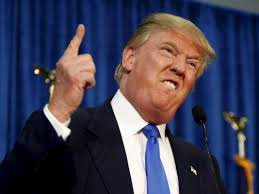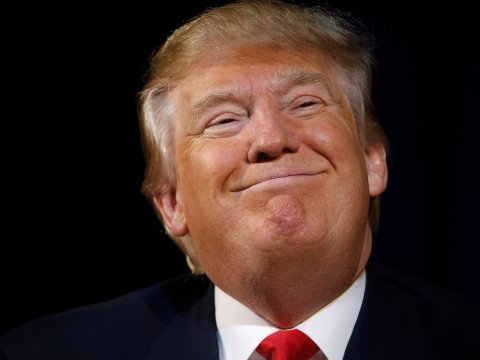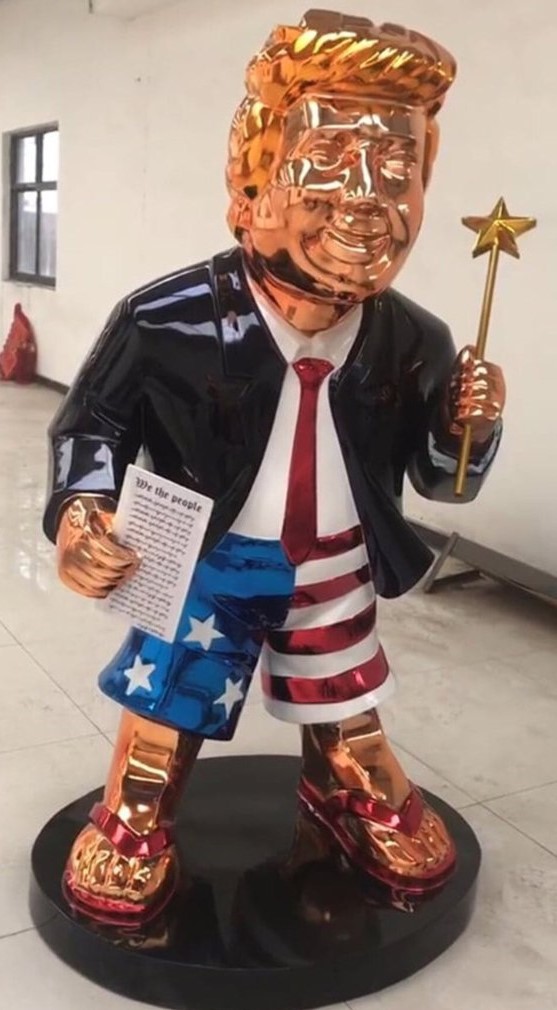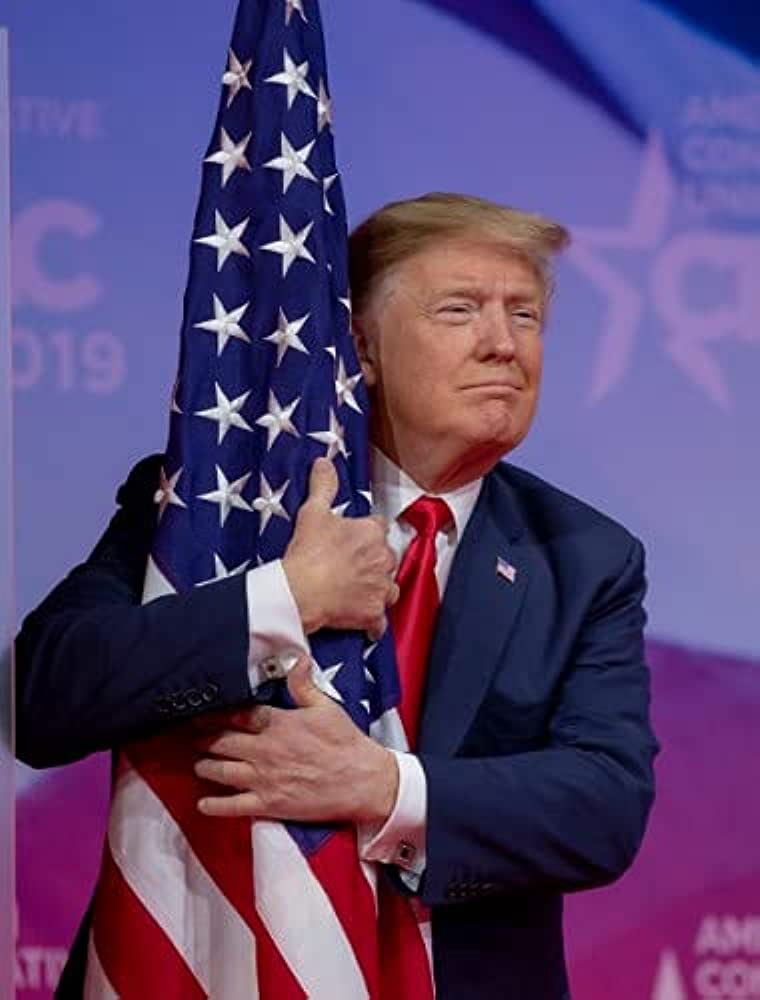Posted on December
30, 2022
Orange You Curious?
Policy questions Trump should have to
answer
by
Daniel
Clark
Almost two years away from the next presidential
election, former president Donald Trump has already declared his intention to
seek the Republican nomination for a third consecutive time. That gives us
about 18 months to finally get some questions answered. As a political outsider
in 2016, Trump won his first nomination without having to define himself. In
the 2020 primary season, he was an unchallenged incumbent. During the two
general election campaigns, conservatives refused to question The Donald, on
the basis of his being the only acceptable option in a "binary
choice," the alternative being a socialist Democrat.
The questions Trump gets from the liberal media, when
relevant, tend to focus on his questionable character and associations. When
they deal with policy at all, they do so while totally detached from reality,
such as when they accuse him of operating concentration camps for children on
our border. The approach toward him that has been taken by nominal
conservatives, on the other hand, has been either to grovel before him, or else
to seek media approval by attacking him from a liberal point of view.
 Seldom,
if ever, has Trump been challenged on substantive policy issues that are
important to conservative Republicans. There is no excuse for such an omission
this time around. The ex-president is no longer an unknown quantity, nor is he
the only plausible choice for Republican primary voters. If Donald Trump is to
be considered for another nomination, against what is likely to be formidable
competition in the 2024 Republican primary, he must be required to answer
questions like these:
Seldom,
if ever, has Trump been challenged on substantive policy issues that are
important to conservative Republicans. There is no excuse for such an omission
this time around. The ex-president is no longer an unknown quantity, nor is he
the only plausible choice for Republican primary voters. If Donald Trump is to
be considered for another nomination, against what is likely to be formidable
competition in the 2024 Republican primary, he must be required to answer
questions like these:
* Why did you not fire Dr. Fauci, instead of just
retweeting the hashtag #FireFauci? Did you expect someone else to do it for
you?
* Before you entered politics, you advocated such
extreme left-wing economic policies as nationalizing the banks and imposing a
one-time, 14-percent wealth tax. When did you change your mind about these
things, and why?
* You have said the United States should not have
invaded Afghanistan. What, then, should our response to 9-11 have been?
* Conversely, you have said the Soviet Union was
justified in invading Afghanistan in 1980, in order to defend itself against
terrorism. Why do you offer this as a motivation, when the Soviets never did so
themselves? Why would the same justification not apply to the U.S., which
actually had been hit by a terrorist attack that had been hatched in
Afghanistan?
* How did the duration of the Afghan War justify
surrendering that country to the Taliban, which had been complicit in the
al-Qaeda attacks both before and after the fact? Do you even agree that the
Taliban were accountable for harboring al-Qaeda? Why did you think it might be
a good idea to invite the Taliban to Camp David for negotiations on the week of
9-11?
* You have said repeatedly since Biden's withdrawal from
Afghanistan that you would have kept the Bagram Air Base. How do you reconcile
these statements with the complete withdrawal that was required by your
agreement with the Taliban? You've explained the importance of Bagram by
pointing out the value to America of maintaining a presence in a country that
borders both China and Iran. Is this not a repudiation of your own policy of
"ending the forever war" in Afghanistan?
 *
This agreement also required the sitting Afghan government to release 5,000
Taliban prisoners in exchange for 1,000 of its own people. Is this the work of
a brilliant negotiator?
*
This agreement also required the sitting Afghan government to release 5,000
Taliban prisoners in exchange for 1,000 of its own people. Is this the work of
a brilliant negotiator?
* Your agreement with the Taliban would meet the
definition of a treaty, except that it's one you made without the advice and
consent of the Senate. Why did you conclude that Article II, Section 2 of the
Constitution did not apply to this particular case?
* You have criticized President Biden for projecting
weakness on the part of the United States, thereby inviting acts of aggression
from our adversaries. Did you not also project weakness by surrendering to the
Taliban, allowing the Turks to order you out of Syria, and pulling back from
threatened air strikes against Iran at the last minute?
* Your criticisms of the Iraq War are based in part on
your stated belief that Saddam Hussein was effective at killing terrorists. Can
you name a single terrorist leader he ever killed, or a single terrorist
organization toward which he was unfriendly?
* In 2018, you tweeted with regard to North Korea,
"Wow, we haven't given up anything & they have agreed to
denuclearization." Why did you believe this to be true? Even if it had
been, would gloating about it on social media have been a shrewd diplomatic
move?
* A year later, you tweeted, "I believe that
chairman Kim has a great and beautiful vision for his country, and only the
United States, with me as president, can make that vision come true." What
is the great and beautiful vision that Kim Jong Un has for North Korea, and
what is it that you would do to make it come true?
* Is Kim Jong Un's vision
for South Korea also beautiful, and would you like to make that come
true, too?
* If you were president for another four years, is
there any chance that you would withdraw American forces from the Korean DMZ?
* You have said that trade wars are easy to win. Do
you believe you have demonstrated this to be true? If so, how?
 *
Will you please, finally explain which specific provisions of NAFTA were so
terrible, and what you did to fix them when you negotiated the USMCA?
*
Will you please, finally explain which specific provisions of NAFTA were so
terrible, and what you did to fix them when you negotiated the USMCA?
* If NAFTA was the source of so many of our economic
woes, then why have we had three very strong economic recoveries, including one
during your own presidency, since its passage? Why did you and members of your
administration repeatedly attribute the improving pre-COVID economy to NAFTA's
demise, when you surely knew that it was still in force at the time?
* Why did Mexico and Canada so readily sign on to the
USMCA if it was taking away the unfair advantage they supposedly gained over us
through NAFTA?
* You once tweeted, "Tariffs are the
greatest!" You know that a tariff is a kind of tax, right? You later
declared your tariff hikes to have been successful, on the basis of how much
new revenue they brought in to the federal government. Is that how a Republican
president should define success?
* On at least two occasions, you have advocated the
readmission of Russia into the G7, something in which nobody else appears to be
interested. Why is this important to you?
* A fence along our Southern border has been required
by law since 2006. How much more progress, in terms of miles of new fencing
where none had already existed, did you make in your four years compared to the
previous decade?
* That 2006 law called for the construction of a
double fence, with a space in between for vehicles driven by border guards to
patrol the area. Why do you believe the single panel design you chose is
superior?
* When you suggested that this structure be covered
with solar panels, were you joking?
* How, exactly, did you attempt to make Mexico pay for
the wall, and would you take a different approach if given another four years?
* You have been adamant that your border structure is
a wall and not a fence, so why did you find it necessary in your executive
order to redefine the word "wall" in such a way that a fence
qualifies as a wall?
* Since when does the president have the power to
redefine words, anyway?
* Do you understand that if you reduce our trade
deficit with Mexico, that would not in any way translate into Mexico making a
payment to the U.S. Treasury?
* If the purpose of your tariff increases was to
reduce our trade deficit, then why did the trade deficit increase every year
during your presidency?
 *
Why do you talk as if having a trade deficit with another country means the
other country owes money to the United States? When an American pays a certain
amount of money for an imported item, does he not receive something equal in
value to what he is paying?
*
Why do you talk as if having a trade deficit with another country means the
other country owes money to the United States? When an American pays a certain
amount of money for an imported item, does he not receive something equal in
value to what he is paying?
* Why didn't you decide to become "the law and
order president" before signing the First Step Act, which reduces
mandatory minimum sentences and allows prisoners to earn "time
credits" toward early release?
* Both before your presidency and afterward, you have
called for the death penalty to apply to drug dealers, yet you have reduced
many of their sentences through the First Step Act, and commuted the
sentences of others, such as high-level cocaine dealer Alice Marie Johnson.
Which, if either, represents your true position? Is there no happy medium
between decriminalization and execution?
* Why do you support red flag laws, whose very aim is
to infringe upon people's right to keep and bear arms?
* If you were not a former president, how hard do you
think it would be to disarm you, through enforcement of a red flag law?
* After the Las Vegas shooting, you signed an
executive order banning bump stocks, which you justified from a legal
standpoint by defining them as machine guns. Do you think a bump stock is a
machine gun? Do you understand that the addition of a bump stock to a
semiautomatic weapon does not turn it into an automatic weapon, but still
requires a separate pull of the trigger for every shot?
* At one point in your presidency, you had agreed with
Democrats on a $2 trillion infrastructure plan. Do you intend to pursue this if
you are elected again?
* We have had three consecutive presidents who have
advocated multi-trillion dollar deficit spending bills devoted to federal
infrastructure projects. Does it bother you that you're one of them?
* One of your most repeated 2020 campaign themes was
the claim that you had "rebuilt the military." How, specifically, did
you accomplish this?
* In March of 2018, you proposed diverting military
funds to the construction of a border wall, based on your justification that
"our Military [sic] is again rich." Do you mean to say that within
the span of two years, our military went from being dilapidated to being
"rich" enough for its funds to be siphoned away for other projects?
* In December of that same year, you openly took
responsibility for a government shutdown on the basis that it was necessary to
secure funding for a border wall. A month later, you agreed to end the
shutdown, without having obtained the funding. Why had maintaining nonessential
government functions come to outweigh the importance of border security?
* What was the point to rebuilding the military, if
you were bent on surrendering to the likes of the Taliban anyway?
It may seem counterintuitive that the world's most
dominant and controversial political figure has gone seven years and counting
without having to answer for any of this, but the explanation is really quite
simple. Conservative commentators who went all in for Trump without skepticism
want badly to go on believing he's a lot more conservative than he really is,
and so do his unhinged enemies in the liberal media. Regardless of which side
they're on, the people whose job it is to ask these questions don't want to
receive the answers any more than Trump wishes to give them.
The Shinbone: The Frontier of the Free Press